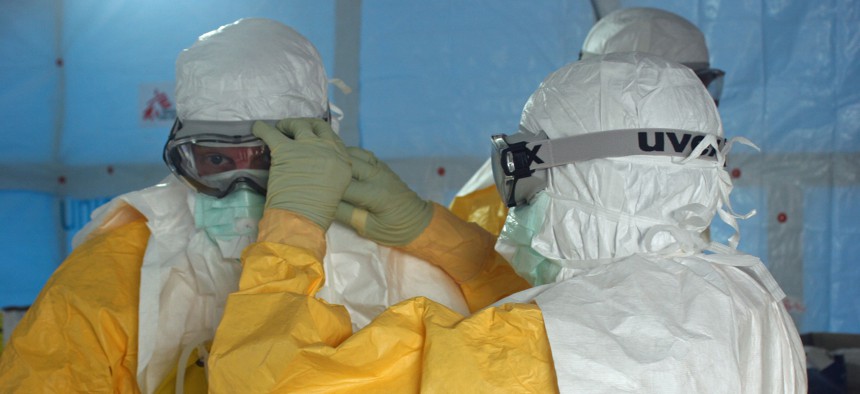
A CDC official get ready to enter an ebola treatment unit in 2014 in Sierra Leone. CDC
Ebola Still Scares Congress, so They’re Pushing More Spending to Fight Disease
The Centers for Disease Control and Prevention's preparedness funding gets a boost in a House appropriations bill.
The Ebola outbreak may end up boosting the budget of the agency in charge of fighting pandemics, as House Republicans and President Obama are calling for more funding to prevent and battle the next wave of deadly diseases.
House appropriators are proposing to give the Centers for Disease Control and Prevention an additional $108 million next fiscal year for outbreak preparation and response and for other medical emergencies.
Last year's Ebola crisis was the largest in history and left more than 11,000 people dead worldwide. The vast majority of those were in western Africa, but it was the four Ebola cases—and one death—in the United States that engendered stateside hysteria and some serious reflection about American readiness for epidemics. The CDC's funding was cut by almost $600 million from 2010 to 2014, and its leaders warned that the cuts had "eroded our ability to respond" to the epidemic.
Now, it appears lawmakers want to reverse the trend. The House appropriations bill released Tuesday would give the CDC $7 billion in funding in fiscal 2016, a $150 million boost from 2015 and the amount that Obama had requested. It injects an additional $108 billion into the agency's Public Health Preparedness and Response office, which is tasked with planning for and reacting to pandemics and bioterror attacks. That would be a 7.2 percent increase, which would give the office nearly $1.6 billion to do its work next year.
"It contributed a great deal," Rep. Tom Cole, chairman of the House Appropriations subcommittee that oversees the CDC, said of the outbreak. "It showed us how important it is, how rapidly things can change, and they need to be as robustly funded in terms of what they think is necessary as you'd fund the American military because disease moves with that kind of speed in the modern world."






